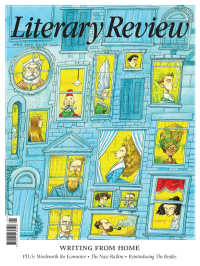Ian Critchley
Winona Rides Out
A Thousand Moons
By Sebastian Barry
Faber & Faber 262pp £18.99
Sebastian Barry’s 2016 novel Days Without End, which won that year’s Costa Book of the Year award, is an often violent but also wonderfully poetic vision of a soldier’s life during the American Civil War. Narrated by displaced Irishman Thomas McNulty, it describes his growing love for fellow soldier John Cole and their adoption of a Native American girl, Winona, following the massacre of her family. A Thousand Moons picks up the story in the 1870s, a few years after the end of the war. It is narrated by Winona, now aged around seventeen (like several in the novel, she is not entirely sure of her birth date – a result of the chaos of the times). She is living with Thomas and John on the farm of another former soldier, Lige Magan, near Paris, Tennessee.
As in the previous novel, there are shocking acts of violence in A Thousand Moons, but this time they are directed against individuals rather than armies or tribes. The Union army may have won the war, but in the formerly Confederate state of Tennessee peace is not yet entirely secured.

Sign Up to our newsletter
Receive free articles, highlights from the archive, news, details of prizes, and much more.@Lit_Review
Follow Literary Review on Twitter
Twitter Feed
The latest volume of T S Eliot’s letters, covering 1942–44, reveals a constant stream of correspondence. By contrast, his poetic output was negligible.
Robert Crawford ponders if Eliot the poet was beginning to be left behind.
Robert Crawford - Advice to Poets
Robert Crawford: Advice to Poets - The Letters of T S Eliot, Volume 10: 1942–1944 by Valerie Eliot & John Haffenden (edd)
literaryreview.co.uk
What a treat to see CLODIA @Lit_Review this holiday!
"[Boin] has succeeded in embedding Clodia in a much less hostile environment than the one in which she found herself in Ciceronian Rome. She emerges as intelligent, lively, decisive and strong-willed.”
Daisy Dunn - O, Lesbia!
Daisy Dunn: O, Lesbia! - Clodia of Rome: Champion of the Republic by Douglas Boin
literaryreview.co.uk
‘A fascinating mixture of travelogue, micro-history and personal reflection.’
Read the review of @Civil_War_Spain’s Travels Through the Spanish Civil War in @Lit_Review👇
John Foot - Grave Matters
John Foot: Grave Matters - Travels Through the Spanish Civil War by Nick Lloyd; El Generalísimo: Franco – Power...
literaryreview.co.uk